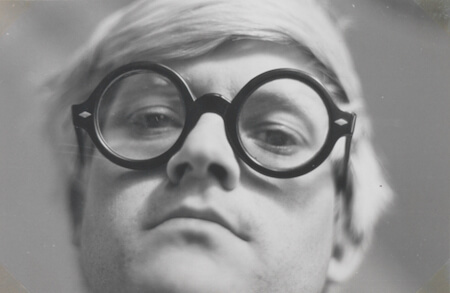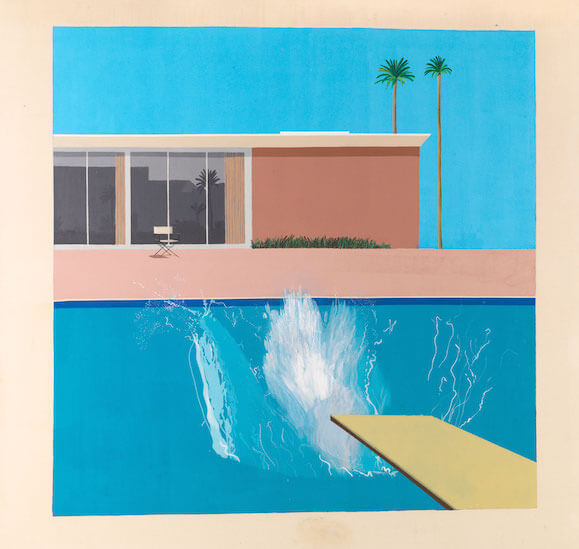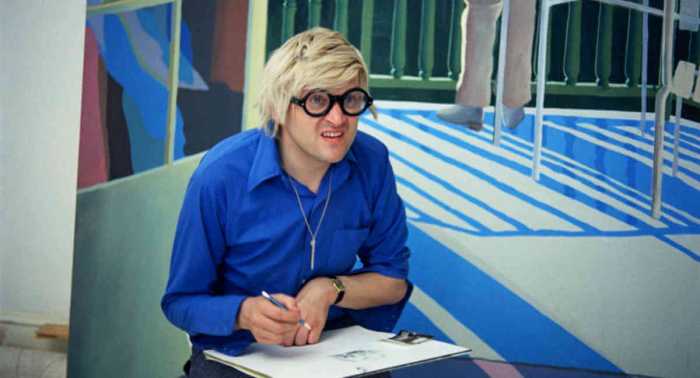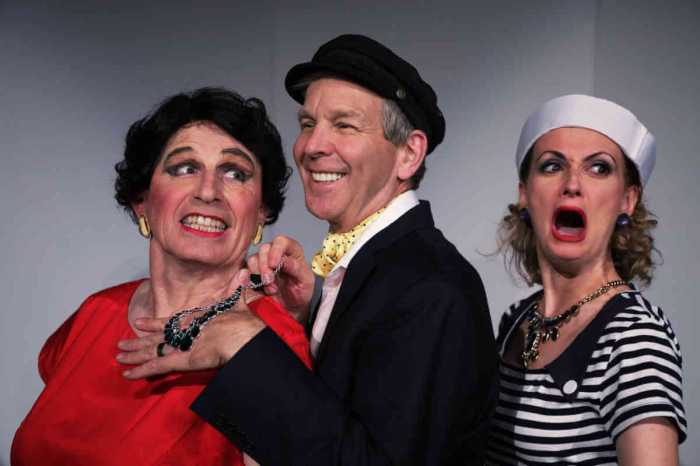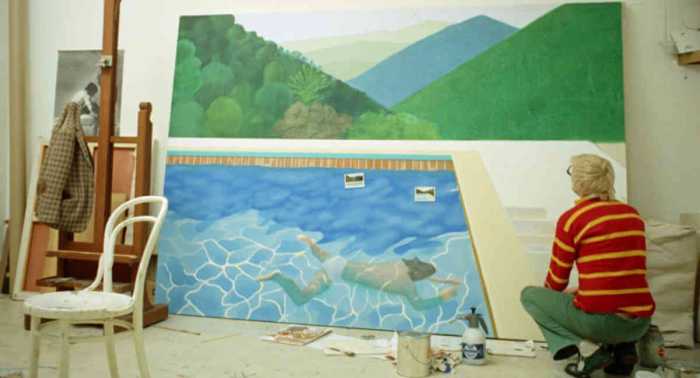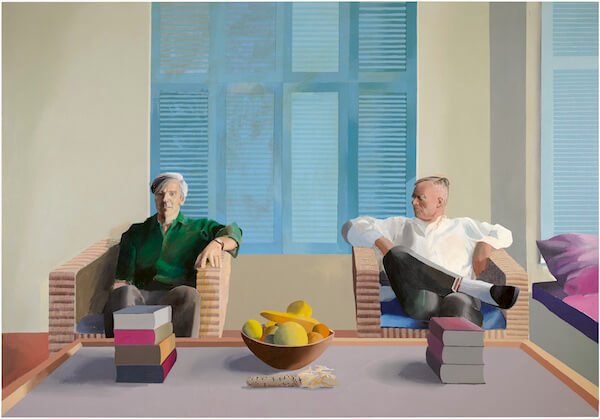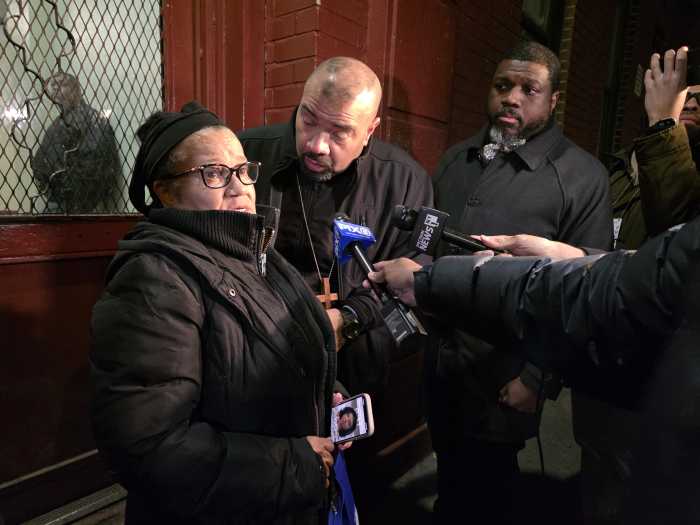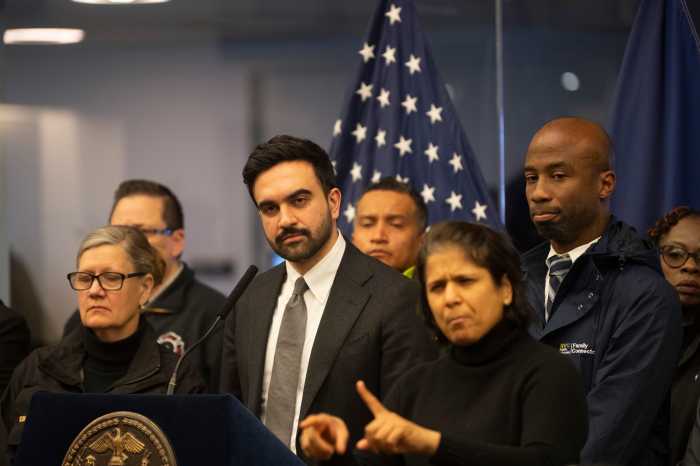Randall Wright’s marvelous documentary “Hockney” is a profound appreciation of the celebrated gay artist. The film captures its subject through a mélange of quotes from Hockney, anecdotes by friends, and outstanding archival footage and photographs.
Then there is the artwork itself. Wright emphasizes the painter’s unique way of seeing in his work, which is tied to his emotions. Hockney represents his sexuality in his erotic paintings of surfers; he uses color in his art, home, and flamboyant fashion; and he widens viewers’ perspective in his use of borders and collage.
Randall Wright, who’s long known the painter, presents an intimate portrait
The director, who has known Hockney for a decades — he filmed “David Hockney: Secret Knowledge” in 2002 — spoke with Gay City News.
GARY M. KRAMER: What image comes first to mind when you think of David Hockney
RANDALL WRIGHT: “A Bigger Splash.” It’s a powerful image. It took a while for me to register the source of his power. It’s warm, it’s a swimming pool, yet at the same time, there’s a detachment, a suspension of time. The diver isn’t going to come up — he’s beneath the water. There’s something complex and paradoxical about his playfulness.
GMK: Yes, there is a real melancholy in his work, even though it’s bright and colorful. Why do you think that is?
RW: He’s criticized for dwelling on the optimistic. However, in his work, there’s more anguish — not anger, not depression. That’s what makes his painting extraordinary. And he’s a great draftsman. He has an emotional response. The painting of his mother with amazing blue eyes — he sees a beautiful human being. He represents people without judgment. He was able to reproduce images without embarrassment that represent his sexuality. That’s what I wanted to do in the film.
GMK: “Hockney” presents an intimate portrait of the artist — and less about his importance or success. Can you discuss why you took this approach?
RW: I find those condensed biographies very unsatisfying. There’s a kind of paradoxical intimacy in “Hockney.” It’s a diary of his life, and it’s intimate and revealing, but it’s what David’s chosen to show us. There is a great deal more we don’t see. The montage in this film was very carefully considered. We go from emotion to emotion; each one is associated with particular phase of his work. The “Blue Guitar” stage is interesting. It’s incredibly creative, and occurs after Peter [Schlesinger, Hockney’s lover] leaves him. But it’s also intellectual. I wanted to compartmentalize his work, from his analytical asking of what a picture is, to what he feels, to his making a picture that’s transparent to his emotions. I think his most creative art — “Mulholland Drive,” “A Bigger Splash” — is what happens when all that comes together.
GMK: His emotions are very much on display in the film. Where do you think that sensitivity comes from?
RW: One of David’s gifts is to give us the deepest, deepest feeling of something. David has a very strong connection with humanist cinema. David was attached to cinema because artists were making emotional connection through bodies. It’s why he went to Hollywood.
In contrast, conceptual artists are talking about art, but not saying what they feel… David’s enjoyment of life is contrasted with the difficulty of finding love or friendship or artistic direction. I wanted to tease out how much of his personality and art is from the upbringing in the north of England, the idealism of the post-World War II era, the age of AIDS, or not finding a simple love or home.
GMK: Home is a key element in Hockney’s life and work. Your film traces him as a child in Bradford, Yorkshire, then briefly in New York, before moving to Los Angeles. Where do you think he was most comfortable and creative?
RW: His great achievement was to be in LA. When he painted his early gray east Yorkshire landscapes, he was doing it from memory in LA. He left Bradford, a cold place where he was inhibited, where his sexuality would cast a shadow, to LA, where his life had a liberal dimension, a bohemia. It was a warm place for him to reinvent himself. The journey of his life is to come back home, but David isn’t like that — he is always searching.
GMK: Given your knowledge of Hockney, what surprised you in the process of making the film?
RW: In a way you discover something new when you look carefully at the pictures. It’s a film that steps through his emotions. What surprised me was the degree to which David is lonely, and his art is a gift to us. Whatever happens, he keeps making the pictures and is hopeful. That sounds sentimental, and he is sentimental, but it is surprising that someone so successful and who has lots of friends is a bit isolated. It has something of him being a romantic artist who is caught in a postmodern, cynical world. He has an innocence about him. My film is an attempt to make a picture of him. It’s not definitive, but you fall in love with his way of seeing.
HOCKNEY | Directed by Randall Wright | Film Movement | Opens Apr. 22 | The Metrograph, 7 Ludlow St., btwn. Canal & Hester Sts. | metrograph.com | Film Society of Lincoln Center, Francesca Beale Theater, 144 W. 65th St. | filmlinc.org

